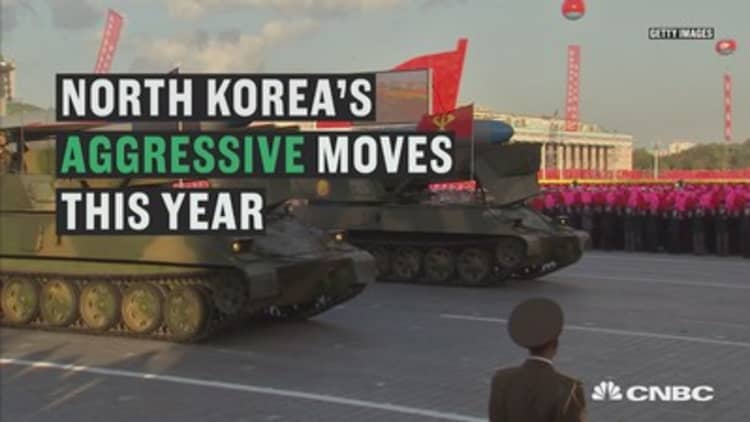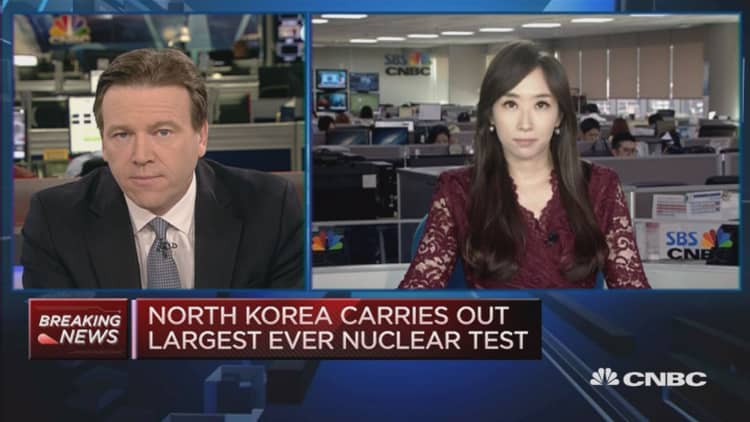
North Korea has been restive this year, picking up the pace of its missile and nuclear tests, a worrying development from a country that regularly threatens to turn South Korea into a "sea of fire."
Some analysts believe the country may be capable of hitting its neighbors with nuclear-tipped missiles by as early as 2020.
On January 6 of this year, the North conducted its fourth nuclear test, spurring a magnitude 5.1 earthquake. North Korea claimed it was a successful test of a hydrogen bomb, calling it a "H-bomb of justice."
"It was confirmed that the H-bomb test conducted in a safe and perfect manner had no adverse impact on the ecological environment," the official Korean Central News Agency (KCNA) of DPRK said at the time.
"This test is a measure for self-defense the DPRK has taken to firmly protect the sovereignty of the country and the vital right of the nation from the ever-growing nuclear threat and blackmail by the U.S.-led hostile forces," it said, calling the U.S. a "gang of cruel robbers" that had caused North Korea "thrice-cursed and unheard-of political isolation."
Outside experts were skeptical of the North's claim to possess an H-bomb, but the nuclear test spurred tough new United Nations sanctions on the country.
On February 7, North Korea fired a long-range rocket that it claimed put a satellite into orbit. At the time, the U.S. Strategic Command said it had detected a missile entering space, while South Korea's military said an object had been placed into orbit, Reuters reported. The object was believed to have at times achieved a stable orbit, but not to have transmitted data. But concerns were primarily that North Korea was using the launch as a cover to test a long-range missile.
On July 6, the U.S. placed North Korea's leader Kim Jong Un and other officials on a sanctions blacklist for the first time, citing a laundry list of human rights abuses. That meant those officials' assets would be frozen and they were barred from undertaking transactions with U.S. citizens.


North Korea's official news agency said it was "unheard-of hideous hostility," that had "passed over the 'red line,'" adding that the U.S. report was "peppered with lies and fabrications."
"The U.S. dared challenge the dignity of the DPRK supreme leadership, an act reminiscent of a new-born puppy knowing no fear of a tiger," the news agency said. "This is the worst hostility and an open declaration of war against the DPRK."
On August 24, North Korea fired a ballistic missile from a submarine toward Japan. It flew around 300 miles, reaching Japan's air defence zone, before falling into the Sea of Japan. South Korea's Yonhap News Agency reported that if fired at a less steep angle, the full range could have been as much as 600 miles.
There was also the potential that firing a missile from a submarine would help North Korea evade anti-missile systems in the South, Reuters reported.
The launch came as South Korean, Chinese and Japanese foreign ministers were meeting in Tokyo.
On September 5, North Korea launched three ballistic missiles into the sea, in a test coinciding with the G-20 leaders' meeting in China. The missiles traveled around 600 miles, entering Japan's air defense zone, Reuters reported.
Hard on the heels of those launches, North Korea said on September 9 that it had undertaken its fifth nuclear test, which was potentially its largest yet.
South Korea's "Blue House," the equivalent of the U.S. White House, said that the country's president, Park Geun-hye, said the North conducted a nuclear test, saying it proved the leader of North Korea, Kim Jong Un, behaved with "maniacal recklessness."
Follow CNBC International on Twitter and Facebook.
—By CNBC.Com's Leslie Shaffer; Follow her on Twitter @LeslieShaffer1


